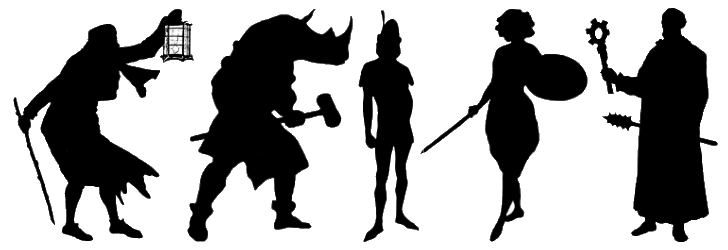All role playing games have one thing in common: characters. You, the player, assume the role of a fictional character out to save the world, stop the bad guy, etc. For many, character creation can daunting, either because they're new, don't know the system or whatever. Even the veterans have trouble making a truly fun character at times. I've compiled a list of seven questions that I feel, when seriously considered, help a player make a truly memorable character.
- What is your character concept?
- What does your character look like?
- What drives your character?
- What does your character excel at?
- What hinders your character?
- How does your character react to physical and social conflict?
- What about your character would interest/entertain the other players?
These are pretty straight forward questions that wouldn't take anybody very long to answer. For a newcomer to the table they can be a valuable asset to understanding the mechanics of the hobby. Here's a quick breakdown of each question.
What is your character concept?
This one is more complicated than you may think. While many people joining the hobby are familiar or at least aware with common fantasy and science fiction tropes, there are many games that follow their own path and don't incorporate them. Simply put, you're not going to be able to play a giant in dungeons & dragons unless you go digging for a custom race online. Its important to get to know the specific game you're playing first so you know where your limitations lie.
For beginners its always a sensible option to play the sheet. If you're playing a cop in a Call of Chthulu game, make them act like a cop. Bust people, harass teenagers, etc. They may not be the most complex character ever, but its not a bad way to start.
That being said, there is nothing wrong with adding another layer onto your character that has nothing to do with what's on the sheet, in fact do so! Your character be the comic relief that's always cracking wise or a total snob. They can be superstitious or crazy. Don't think that just because its not covered in the book that its not allowable.
What does your character look like?
While not the most important question, it serves two purposes. One, at some point you're going to be asked what your character looks like. Two, the visualization of your character helps you as a player make decisions during character creation. Is your character meek or burly? Do they wear armor or have a distinct article of clothing? When it comes to assinging values to stats or selection gear, having a good idea of your character's look can help with niggling questions.
What drives your character.
Now we're getting into the juicy bits. Every character has a goal or motivation and many character builds have a suggested one. Thieves steal, warriors fight, detectives investigate. This idea goes along with playing the sheet; you do what you assume your character would do. By coming up with you're own drive, you create more role playing opportunities for yourself and the other players, including the GM.
It is important to note here tbat you want to come up with something manageable for yourself. Like character concepts, players will sometimes bite off more than they can chew, or the game can handle, when they pick a goal. The goal for your character may be for them to own their castle, but its going to be pretty hard to lug around all the money necessary to do so. There is nothing wrong with being simple and sensible with your drive.
What does your character excel at?
Going about answering this question varies from system to system. In a more rules heavy game like Shadowrun, the class outlines your options as a opposed to a rules lite game like Fate, where you have to select them yourself. For first time players I definitely advise playing the sheet. It will help your character stay alive and learn how to be useful in their function. Once you have a bit more experience under your belt, you'll better understand how to tweek your character.
What hinders your character?
I'm going to say this now: it is ok to fail. I repeat: IT IS OK TO FAIL
No one wants to or is happy about failing in game, but there is nothing wrong with it and it helps move the game along. I mention this now because I want to make it clear that your character should have at least one prominent flaw and that you should not avoid it. This hinderance can be anything from a below average number of stats to alcoholism. Many systems have a merit and flaw mechanic and I recommend taking advantage of them. Its too easy to get swept up trying to keep a beloved character from harm, but its so much more interesting to have them stumble every once in a while. And like I've mentioned before, this flaw can come completely from your concept and not from the sheet.
How does your character react to physical and social conflict?
Depending on your concept, this question can be a no-brainer or kind of tough. I added it to the list to illustrate that the player has a choice in this matter and that this choice should reflect the character concept. You can play a fearless warrior, but they can also be merciful and choose not to fight anyone weaker than them. The character can be brave in the face of an enemy but fold in uncomfortable social situations. This is a fun concept to experiment with that is almost entirely based on your concept and not what is on the sheet.
What about your character would interest/entertain the other players?
Role playing is a group activity and nothing puts a table to sleep faster than someone hogging the spotlight. That's not to say your character can't have center stage from time to time, but the thing to remember is everyone at the table is the main character. You are going to want at least some part of your character that makes others want to interact with you, outside of just your function.
The beauty of this questtion is that it can be the answer to any of these other questions or already outlined in the game. If you're the comic relief, you'll have people laughing. If you want to be merciful, you'll create debate at the table. Spending a moment to figure out how your charzcter will fit into the group is time well spent. Ask for opinions, see what others are doing. It will help create party cohesion in the end.
Really what this all boils down to one thing: stop just jotting down numbers and think about your character. A core mechanic in almost every system is character growth and you will have a lot more fun doing so with a fleshed out character rather than a cardboard cutout swinging a sword.
(Character silhouettes courtesy of Telecanter)






Congratulations on your first article that is definitely worth of the front page. I took the liberty of formatting it a little and illustrating it.
About the topic, I went through the normal steps of any role player: I started by creating overpowered characters that I made out of number more than actual roleplay. They were proficient at combat and that was about it. Then a very talented Game Master made me realize that roleplay was actually a little bit deeper than that, and I started enjoying playing flawed characters. These days, I'm not even about the progression and the character build up, I'm fully reveling in funny scenes in otherwise serious contexts, especially when my character's flaws are causing them.
A while back, I created a handful of character defined by their flaws. A Shadowrun character that despise anything modern trapped in a futuristic Seattle or a D&D Loyal Neutral Monk Drow that escaped its underground monastery but soon found out that the sunlight was burning its skin for example.
My personal favorite flawed character that I made was a pilot in a Paladium game years ago. He was a cocky fly-boy with an untouchable attitude that screwed up big one night and got a squadmate killed. For the rest of the game he wore a brown leg band and he never made that mistake again.
As a soon to be dungeon master, this is really helpful especially as I feel that I've never been able to answer those questions myself when creating a roleplaying character. This really is key to creating interesting characters that will be as entertaining to play as they'll be entertaining to play with. And that matters a lot to DM as well, as it's better to have a funny group to entertain rather than flat, boring characters I feel. Many thanks for that article!
No problem buddy. Glad you found it informative.